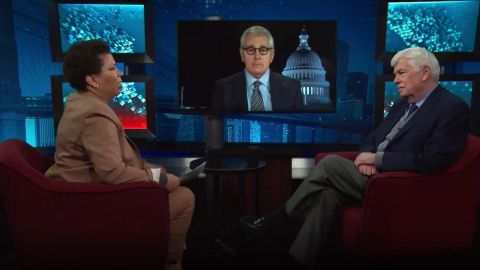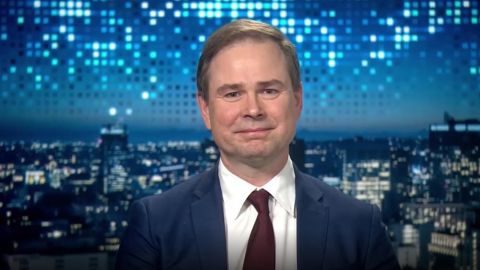Read Transcript EXPAND
CHRISTIANE AMANPOUR: It seems that Shakespeare can be invoked to memorialize or sort of contextualize just about everything. But I am fascinated by the focus on this right now during the time we’re in, particularly to start off with one of the many bits that you write. You say: “His writing continues to function as a canary in the coal mine, alerting us to among, other things, the toxic prejudices poisoning our cultural climate.” Let’s start there first. Tell me about that and then we will talk about coronavirus.
JAMES SHAPIRO, AUTHOR, “SHAKESPEARE IN A DIVIDED AMERICA”: I wrote that specifically about the United States, although it could easily be extended to other countries. Right now, there is a chasm between the left and the right in America, and one of the ways in my book about “Shakespeare in a Divided America” is which I explored that was looking at Shakespeare and how he tells us where we have been and where we’re going on issues of race, on issues of immigration, and although I didn’t discuss it in my book, sadly, on issues of plague.
AMANPOUR: Well, let’s talk about the plague to begin with, because all those other issues are so, so vital. But now all anybody can think of is surviving what we’re going through right now. It is, again, quite common in these times to say, oh, well, Shakespeare wrote King Lear during a plague. First, is that true?
SHAPIRO: Shakespeare lived through two terrible plagues in London. The first was in 1592-’93 that wiped out tens of thousands of Londoners, perhaps a seventh of the population. And a decade later, plague returned with a vengeance in 1603. And it recurred for the next eight years. So there wasn’t really a moment in the second half of Shakespeare’s career that he wasn’t working either under the threat of plague or during an outbreak of plague. And King Lear was probably written during an interim while the theaters were open, but at the moment that Shakespeare was going to capitalize on its great success in the spring and summer of 1606, the theaters closed. The theaters closed any time there were more than 40 — 30, 40 plague deaths in London. So, he had to wait, watch his theater company disband, as is happening all over the world and obviously in the U.K. and U.S. right now. So, he wrote that under the pressure of plague. He didn’t write that play during plague time, but he wrote many others during plague time.
AMANPOUR: OK. So what plays did he write under plague — or about plague, rather?
SHAPIRO: I think “Macbeth” was written as plague was starting to occur in the middle of 1606. The numbers always started small, as they do now, and then they grow quite dramatically, as we’re watching that curve that we talk about flattening at the moment.
About This Episode EXPAND
Denmark’s Finance Minister joins Christiane to explain what his government is doing to mitigate the current economic crisis. World-renowned Shakespeare expert James Shapiro discusses what we can learn from the playwright in these challenging and uncertain times. Former senators Christopher Dodd and Chuck Hagel tell Michel Martin why they signed an open letter condemning partisanship in the U.S.
LEARN MORE


